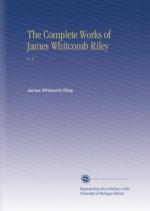|
This section contains 2,863 words (approx. 10 pages at 300 words per page) |

|
SOURCE: Gray, Paul H. “Poet As Entertainer: Will Carleton, James Whitcomb Riley, and the Rise of the Poet-Performer Movement.” Literature in Performance 5, no. 1 (November 1984): 7-12.
In the following essay, Gray argues that Riley was primarily an entertainer and that his poetry was performance art.
Spectacular as Carleton's meteoric career had been, the reputation he established in the 1870s was eclipsed in the very next decade by another poet-performer from the Midwest, James Whitcomb Riley. Though the Indiana poet was just four years younger than Carleton, his career developed at a far more leisurely pace. When “Betsy and I Are Out” thrust Carleton into the limelight in 1871, Riley was just beginning to think of a career on the platform. His heroes at that time were not poets but comedians like Josh Billings, Mark. Twain, and Petroleum V. Nasby.1 Riley wanted to be a performer, not a writer, and the...
|
This section contains 2,863 words (approx. 10 pages at 300 words per page) |

|


